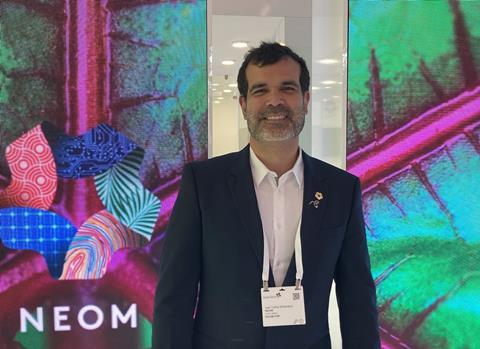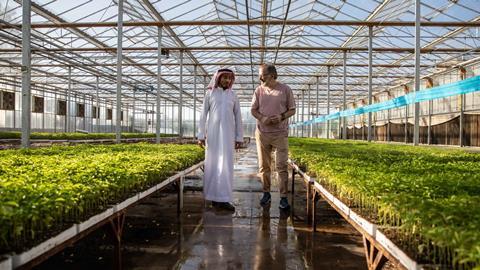Saudi Arabia’s ambitious plan for sustainable agriculture comes from a desire to diversify away from oil and the urgent need to adapt to the new realities of climate change, says Dr Juan Carlos Motamayor of Neom Food
Neom Food has a grand ambition, according to Dr Juan Carlos Motamayor, executive director of the Saudi group that is pioneering food production in the Kingdom. But he says it remains crucial to proceed with caution.
“We are looking at large numbers in terms of volumes, but we are also cautious,” he says. “We are not going to invest in large infrastructure with just one technology without having validated the cost efficiency. We have heard about the issues with profitability in the vertical farming industry. So we believe we have to be cautious.”

This is why the group’s initial approach is for large-scale pilots with combinations of multiple technologies to minimise energy, manage heat and conserve water.
“Saudi Arabia is the largest country in the world without rivers,” says Motamayor. “But even globally, fresh water demand is predicted to outstrip supply by 40 per cent by 2030. So water scarcity is a global problem. Because of our commitment to nature and conservation, which are key values at Neom Food, we are aiming at developing agriculture based on desalinated water. We believe the world will have to adapt to the new realities of climate change and start using water more efficiently.
“We have a commitment to nature conservation, and that means not using the aquifers and also keeping 95 per cent of the land intact. That makes you think in a different way because you need to do things completely differently, much more efficiently.”
Diversification strategy
According to Motamayor, Saudi Arabia is intent on diversifying its economy away from oil, developing future forward industries that are focused on creating solutions to some of the key challenges facing the world, around climate change, the need for renewable energies, and nature conservation.
“You may have heard about The Line and other urban projects Neom is doing,” he says. “Climate-proof agriculture is a key pillar for Neom Food, along with regenerative agriculture, which is addressing the perception that agriculture always has a negative impact on the ecosystem. We believe we can have a net positive impact through different interventions. We believe these changes are needed for the planet, but we also recognise there is a growing market for such sustainable solutions.”
The other main pillar for Neom Food is food imports that match the criteria used for domestic production. “We have these targets to produce high volumes of fruits and vegetables using very specific sustainability principles and key performance indicators, and we want to apply those same sustainability KPIs to the food that we import,” says Motamayor.

Saudi Arabia is promoting healthier diets to combat high rates of obesity and diabetes, and a consumer awareness programme to boost consumption of fruit and vegetables is a major part of that effort.
“We have a partnership with a network of Michelin chefs called Care’s, and their objective is to promote the use of locally sourced ingredients in high-end cuisine, working with farmers to reach the high standards required,” adds Motamayor. “We want to promote consumption of local fresh produce and that sometimes requires creating new uses for local ingredients. Not only do we want to be more food self-sufficient, since in Saudi we import almost 80 per cent of the food we consume, we want to contribute to mitigating climate change and reducing food miles.”
Given the expected impact of climate change, the need to develop new food systems that are more sustainable is urgent, he concludes. “It is this need for urgency that is important to communicate,” he says. “Already there will be the need to adapt and learn to live with some impacts of climate change. If we don’t work on these new systems now, we’re really going to suffer the consequences.”



